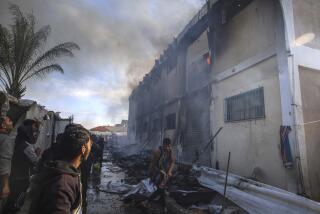Justice Starts With a Little Fish : Trial nonetheless is a key step in addressing Bosnia war crimes
- Share via
In the Bosnian war’s gruesome sea of genocidal rape, mayhem and murder, Dusan Tadic was a brutal but little fish. Today the Serbian prison camp torturer becomes the first person to stand trial for a war crime in the conflict. He will be brought before a United Nations tribunal at The Hague in the Netherlands. To start with someone so low in the official hierarchies marks an unspectacular but--finally--important step for international justice.
Not since the Allied powers tried German and Japanese military prisoners in the aftermath of World War II has the world community risen to support a court demanding adherence to humanitarian standards in the midst of war. The Security Council established the court in May 1993. Three years have passed, and the cells at The Hague hold but three men, including Tadic and a Croatian general who surrendered voluntarily. Fifty-seven men--doubtless a minuscule fraction of those who deserve punishment--have been indicted.
Indicted but still free are Bosnian Serb leaders Radovan Karadzic and Ratko Mladic. They stand accused of responsibility for the slaughter of Muslim soldiers and civilians outside the town of Srebrenica last July. But they deny the authority of the U.N. tribunal. Where is the justice? At Nuremburg the German high command was tried; at The Hague, those indicted are primarily riffraff, political tokens.
The tribunal, established with high hopes, has never had many practical prospects. It has no enforcement arm. The authorities of Bosnia, Croatia and Serbia/Yugoslavia are charged with making arrests, but only the three suspects have been brought in. The NATO peacekeeping force has avoided any policing role. The standards of humanitarian conduct clearly have not been met, either in the fighting or in the attempted application of the law. The dead and maimed deserve more.
More to Read
Sign up for Essential California
The most important California stories and recommendations in your inbox every morning.
You may occasionally receive promotional content from the Los Angeles Times.













